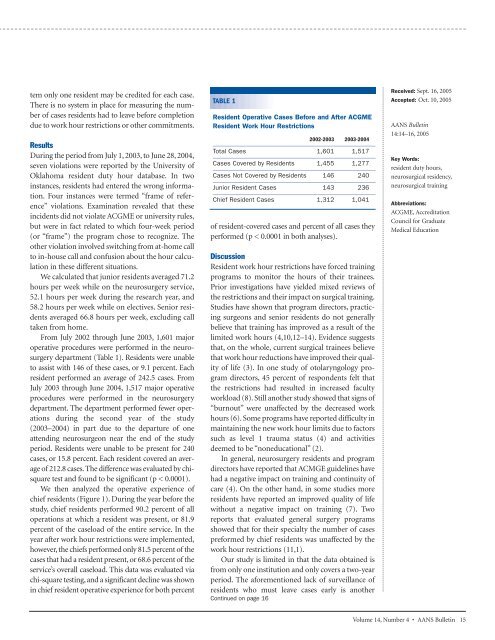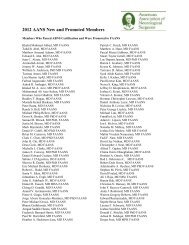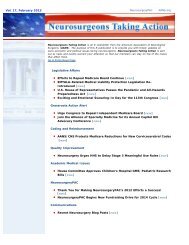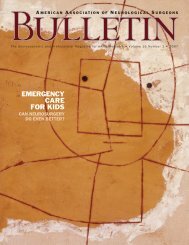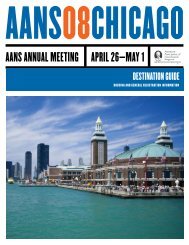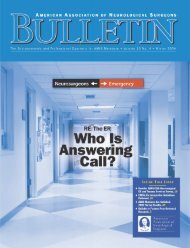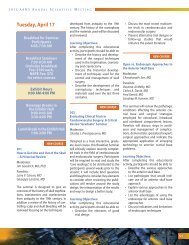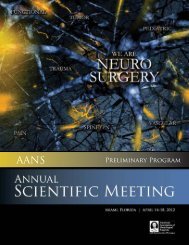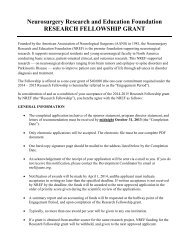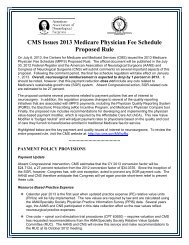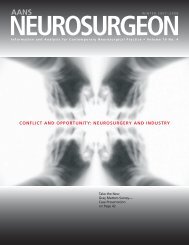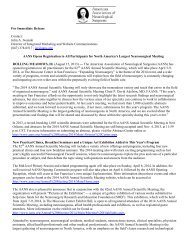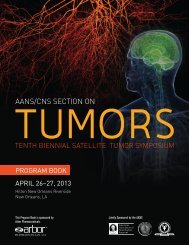view PDF - American Association of Neurological Surgeons
view PDF - American Association of Neurological Surgeons
view PDF - American Association of Neurological Surgeons
You also want an ePaper? Increase the reach of your titles
YUMPU automatically turns print PDFs into web optimized ePapers that Google loves.
tem only one resident may be credited for each case.<br />
There is no system in place for measuring the number<br />
<strong>of</strong> cases residents had to leave before completion<br />
due to work hour restrictions or other commitments.<br />
Results<br />
During the period from July 1, 2003, to June 28, 2004,<br />
seven violations were reported by the University <strong>of</strong><br />
Oklahoma resident duty hour database. In two<br />
instances, residents had entered the wrong information.<br />
Four instances were termed “frame <strong>of</strong> reference”<br />
violations. Examination revealed that these<br />
incidents did not violate ACGME or university rules,<br />
but were in fact related to which four-week period<br />
(or “frame”) the program chose to recognize. The<br />
other violation involved switching from at-home call<br />
to in-house call and confusion about the hour calculation<br />
in these different situations.<br />
We calculated that junior residents averaged 71.2<br />
hours per week while on the neurosurgery service,<br />
52.1 hours per week during the research year, and<br />
58.2 hours per week while on electives. Senior residents<br />
averaged 66.8 hours per week, excluding call<br />
taken from home.<br />
From July 2002 through June 2003, 1,601 major<br />
operative procedures were performed in the neurosurgery<br />
department (Table 1). Residents were unable<br />
to assist with 146 <strong>of</strong> these cases, or 9.1 percent. Each<br />
resident performed an average <strong>of</strong> 242.5 cases. From<br />
July 2003 through June 2004, 1,517 major operative<br />
procedures were performed in the neurosurgery<br />
department. The department performed fewer operations<br />
during the second year <strong>of</strong> the study<br />
(2003–2004) in part due to the departure <strong>of</strong> one<br />
attending neurosurgeon near the end <strong>of</strong> the study<br />
period. Residents were unable to be present for 240<br />
cases, or 15.8 percent. Each resident covered an average<br />
<strong>of</strong> 212.8 cases. The difference was evaluated by chisquare<br />
test and found to be significant (p < 0.0001).<br />
We then analyzed the operative experience <strong>of</strong><br />
chief residents (Figure 1). During the year before the<br />
study, chief residents performed 90.2 percent <strong>of</strong> all<br />
operations at which a resident was present, or 81.9<br />
percent <strong>of</strong> the caseload <strong>of</strong> the entire service. In the<br />
year after work hour restrictions were implemented,<br />
however, the chiefs performed only 81.5 percent <strong>of</strong> the<br />
cases that had a resident present, or 68.6 percent <strong>of</strong> the<br />
service’s overall caseload. This data was evaluated via<br />
chi-square testing, and a significant decline was shown<br />
in chief resident operative experience for both percent<br />
TABLE 1<br />
Resident Operative Cases Before and After ACGME<br />
Resident Work Hour Restrictions<br />
2002-2003 2003-2004<br />
Total Cases 1,601 1,517<br />
Cases Covered by Residents 1,455 1,277<br />
Cases Not Covered by Residents 146 240<br />
Junior Resident Cases 143 236<br />
Chief Resident Cases 1,312 1,041<br />
<strong>of</strong> resident-covered cases and percent <strong>of</strong> all cases they<br />
performed (p < 0.0001 in both analyses).<br />
Discussion<br />
Resident work hour restrictions have forced training<br />
programs to monitor the hours <strong>of</strong> their trainees.<br />
Prior investigations have yielded mixed re<strong>view</strong>s <strong>of</strong><br />
the restrictions and their impact on surgical training.<br />
Studies have shown that program directors, practicing<br />
surgeons and senior residents do not generally<br />
believe that training has improved as a result <strong>of</strong> the<br />
limited work hours (4,10,12–14). Evidence suggests<br />
that, on the whole, current surgical trainees believe<br />
that work hour reductions have improved their quality<br />
<strong>of</strong> life (3). In one study <strong>of</strong> otolaryngology program<br />
directors, 45 percent <strong>of</strong> respondents felt that<br />
the restrictions had resulted in increased faculty<br />
workload (8). Still another study showed that signs <strong>of</strong><br />
“burnout” were unaffected by the decreased work<br />
hours (6). Some programs have reported difficulty in<br />
maintaining the new work hour limits due to factors<br />
such as level 1 trauma status (4) and activities<br />
deemed to be “noneducational” (2).<br />
In general, neurosurgery residents and program<br />
directors have reported that ACMGE guidelines have<br />
had a negative impact on training and continuity <strong>of</strong><br />
care (4). On the other hand, in some studies more<br />
residents have reported an improved quality <strong>of</strong> life<br />
without a negative impact on training (7). Two<br />
reports that evaluated general surgery programs<br />
showed that for their specialty the number <strong>of</strong> cases<br />
preformed by chief residents was unaffected by the<br />
work hour restrictions (11,1).<br />
Our study is limited in that the data obtained is<br />
from only one institution and only covers a two-year<br />
period. The aforementioned lack <strong>of</strong> surveillance <strong>of</strong><br />
residents who must leave cases early is another<br />
Continued on page 16<br />
Received: Sept. 16, 2005<br />
Accepted: Oct. 10, 2005<br />
AANS Bulletin<br />
14:14–16, 2005<br />
Key Words:<br />
resident duty hours,<br />
neurosurgical residency,<br />
neurosurgical training<br />
Abbreviations:<br />
ACGME, Accreditation<br />
Council for Graduate<br />
Medical Education<br />
Volume 14, Number 4 • AANS Bulletin 15


